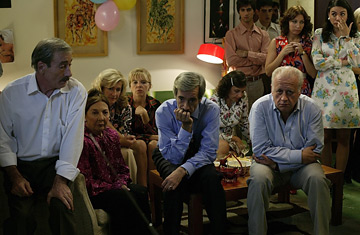
Mercedes (Ana Duato, third from left) and Antonio Alcántara (Imanol Arias, fifth from left) watch news of Franco's illness with their neighbors.
In a television studio just outside Madrid, it is the morning of November 20, 1975. As a tearful President Carlos Arias Navarro, speaking on the country's government-run television and radio stations, chokes out the words Spaniards have been waiting for months, if not years, to hear — "People of Spain: Franco is dead" — the camera slowly pans across the faces of the Alcántara family. No one — not father Antonio, still dressed in his pajamas, nor mother Mercedes, wearing a pink bathrobe, nor anyone else assembled around the dining room table — utters a word. But the uncertainty on their faces speaks volumes for a generation of Spaniards.
The Alcántaras are the heart of Cuéntame cómo pasó ("Tell Me How It Was"), one of Spain's most popular television shows over the last six years. The family is, in many ways, a typical television clan, complete with predictably rebellious children, meddling in-laws, and eccentric neighbors. But because the series takes place in the waning years of the dictatorship (it begins in 1968, and each season matches a subsequent year) and scrupulously strives for historical accuracy, the Alcántaras have become evocative symbols and Cuéntame more than an average family melodrama in Spain. If the country is at last officially acknowledging Franco's traumatic legacy and the price of its transition to democracy, it has — at least in small part — the Alcántaras to thank.
Yet the program almost never happened. Producer Miguel Ángel Bernardeau, working with lead writers Patrick Buckley and Eduardo Ladrón, came up with an idea in 1993 for a show — part historical documentary, part nostalgic drama — set in late-Francoist Spain. Bernardeau would spend the next eight years unsuccessfully shopping the program to the country's public and private television networks. Finally, in 2001, state-owned RTVE, which had previously passed on the show, decided to roll the dice. "To be honest," says Bernardeau, "they took a chance because they had nothing else."
Six years later, Cuéntame is a pop culture phenomenon. On average, four million Spaniards — roughly 10% of the population — tune in every Thursday night to watch the Alcántaras navigate the rapidly changing landscape of late-'60s and early-'70s Spain. Theirs is a story of middle-class dreams: a small-town couple, played by Imanol Arias and Ana Duato, moves from the pueblo to Madrid and attempts to make a better life for their children. The pilot featured the family awaiting the delivery of its first television as housewife Mercedes tried to conceal from her traditional husband the news that their daughter Inés would begin taking birth-control pills. Six years on, the family owns a car, has vacationed in France, and watches nervously as Mercedes begins her university education — tutored by a feminist sociologist, no less.
But for all its focus on the minor struggles of daily life, the program is never divorced from the broader political issues of the day. "The regime's repression is permanently present," says Antonio Macías, one of the show's writers. "Contraception was illegal under Franco — that's why Inés had to get the pills from London. Divorce didn't exist. Women couldn't open bank accounts without their husbands' permission. That's all in the show." So, too, are more direct political references. In recent episodes, Antonio, who runs a print shop, has been forced by right-wing goons to put out leaflets saluting the dictator, while he and Mercedes have worried that their activist son Toni is a Communist. In an upcoming episode, they will join the long lines — some mourning, some celebrating, some simply wanting to see for themselves that the dictator was dead — that shuffled past Franco's open coffin for two days beginning November 21.
For years, Spaniards held their tongues about the nearly four decades of dictatorship that preceded that day. "Silence and fear," says Imanol Arias, 51, who plays Antonio. "That was the atmosphere at my house under Franco." Even after the dictator's death, the silence continued, with little public discourse about the civil war [1936-39]that had brought Franco to power. A semi-official "pact of forgetting" eased the way for the nation's peaceful transition to democracy, but also prevented the scars left by the dictatorship from ever being acknowledged — or treated.
